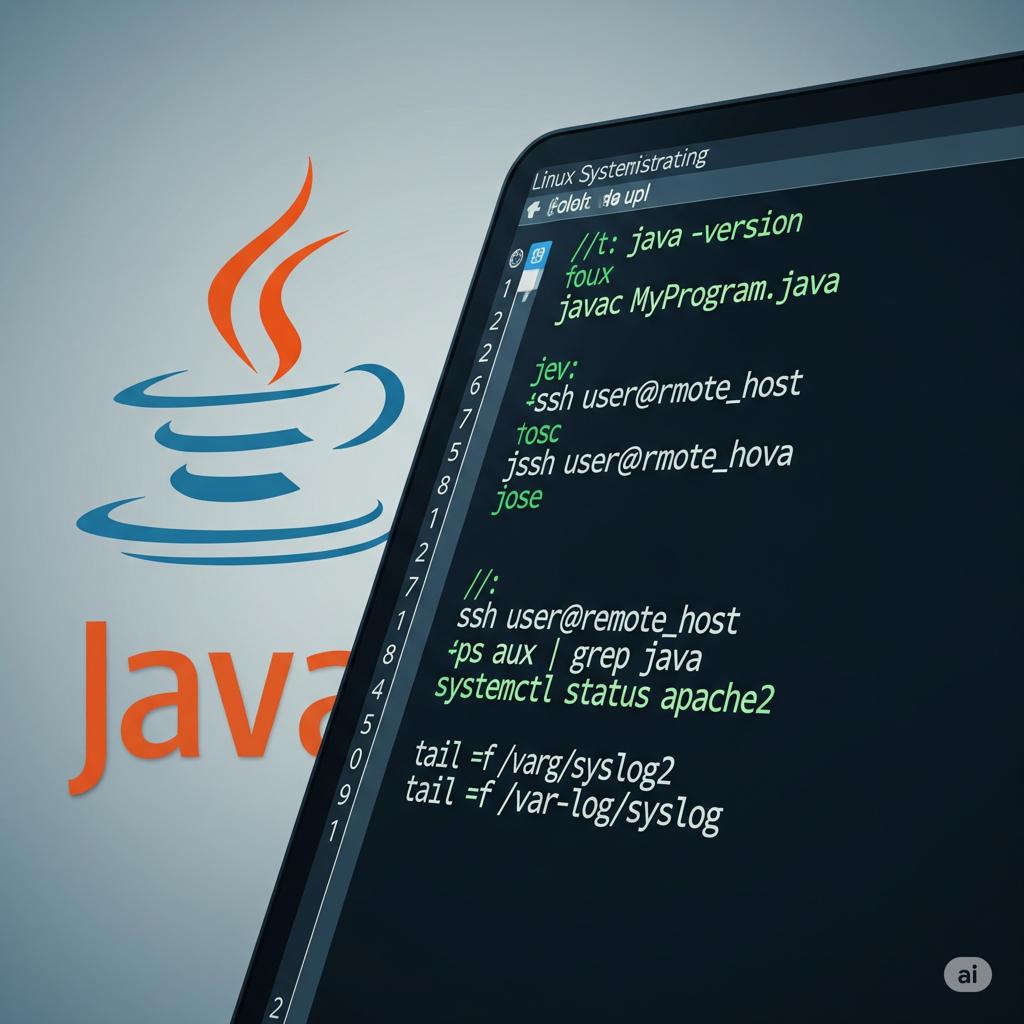
Find All Java Installations on Linux Systems
System administrators commonly have to fight searching for all the Java installations across Linux systems, particularly when dealing with non-standard installations that bypass normal package managers or are situated outside normal PATH directories. Matters become infinitely more complicated with the presence of multiple versions of Java, specialized deployment scripts, or legacy apps that install the Java Runtime Environment in non-standard locations.
Below, and by way of example only, is how the situation can be dealt with. Be very careful with concatenated commands and scripts because dirty characters or errors could lurk there and cause damage. So always make full backups, never run commands that you do not fully understand and have not checked beforehand.
The Universal Java Discovery Command
The most extensive method of Java discovery is a single command which scans the filesystem whole yet responsibly skips around bad directories and offers extensive information about all installations discovered:
echo "--- Start Java scan on $(hostname) ---"; find / -xdev \( -path /proc -o -path /sys -o -path /dev -o -path /run \) -prune -o -type f -name java -executable -print0 2>/dev/null | while IFS= read -r -d '' p; do canonical_path=$(readlink -f "$p"); echo "---------------------------------"; echo "PATH: $p"; if [ "$p" != "$canonical_path" ]; then echo "CANONICAL PATH: $canonical_path"; fi; version_output=$("$canonical_path" -version 2>&1); echo "VERSION:"; echo "$version_output" | sed 's/^/ /'; if pgrep -f -x "$canonical_path" > /dev/null; then echo "STATE: IN USE"; ps -eo user:20,pid,cmd --no-headers | grep -Fw "$canonical_path" | sed 's/^/ /'; else if echo "$version_output" | grep -q 'OpenJDK'; then echo "STATE: NOT IN USE (OpenJDK)"; else echo "STATE: NOT IN USE"; fi; fi; done; echo "--- Scan Completed ---" This command systematically discovers every Java executable on the system, retrieves version information, identifies active processes, and presents the findings in a structured format that facilitates immediate decision-making.
Command Breakdown and Analysis
The command architecture follows a logical progression that maximizes efficiency while providing comprehensive coverage. The initial component uses find / -path /proc -prune -o -type f -name java -executable -print 2>/dev/null to traverse the entire filesystem hierarchy while explicitly excluding the /proc directory to prevent infinite loops and system instability.
The -path /proc -prune directive instructs find to skip the proc filesystem entirely, which contains virtual files that can cause scanning operations to hang indefinitely. The -type f -name java -executable parameters specifically target regular files named "java" with executable permissions, ensuring only legitimate Java binaries are processed.
Error redirection through 2>/dev/null suppresses permission denied messages and other filesystem access errors that would otherwise clutter the output, particularly when running as a non-privileged user.
For each discovered Java executable, the command executes several information-gathering operations. The $p -version 2>&1 invocation retrieves version information, with stderr redirected to stdout to capture all version-related output regardless of how different Java implementations handle version reporting.
The process identification logic uses ps -eo cmd --no-headers | grep -Fw "$p" to locate running processes that utilize the specific Java executable path. The -F flag ensures fixed string matching, preventing false positives from partial path matches, while -w enforces word boundaries for precise matching.
Extended Script Implementation
For environments requiring more sophisticated analysis or integration with monitoring systems, an expanded script version provides enhanced functionality and maintainability:
#!/bin/bash
# Java Installation Discovery Script
# Compatible with all major Linux distributions
HOSTNAME=$(hostname)
SCAN_START=$(date '+%Y-%m-%d %H:%M:%S')
echo "=== Java Installation Discovery Report ==="
echo "Hostname: $HOSTNAME"
echo "Scan started: $SCAN_START"
echo "=========================================="
# Function to check if a process is using specific java binary
check_java_usage() {
local java_path="$1"
local processes
processes=$(ps -eo user:20,pid,cmd --no-headers | grep -Fw "$java_path")
if [ -n "$processes" ]; then
echo "STATUS: ACTIVE (processes found)"
echo "Active Processes:"
echo "$processes" | sed 's/^/ /'
return 0
else
echo "STATUS: INACTIVE"
return 1
fi
}
# Function to extract and format version information
format_version_info() {
local java_path="$1"
local version_output
version_output=$($java_path -version 2>&1)
echo "Version Information:"
echo "$version_output" | sed 's/^/ /'
# Detect Java type
if echo "$version_output" | grep -qi "openjdk"; then
echo " Type: OpenJDK"
elif echo "$version_output" | grep -qi "oracle"; then
echo " Type: Oracle JDK"
elif echo "$version_output" | grep -qi "ibm"; then
echo " Type: IBM J9"
else
echo " Type: Unknown/Custom"
fi
}
# Main discovery loop
java_count=0
find / -path /proc -prune -o -path /sys -prune -o -type f -name java -executable -print 2>/dev/null | while read -r java_binary; do
java_count=$((java_count + 1))
echo ""
echo "[$java_count] Java Installation Found"
echo "Path: $java_binary"
echo "$(ls -la "$java_binary" | awk '{print "Permissions: " $1 " Owner: " $3 " Group: " $4 " Size: " $5}')"
format_version_info "$java_binary"
check_java_usage "$java_binary"
echo "----------------------------------------"
done
echo ""
echo "Scan completed: $(date '+%Y-%m-%d %H:%M:%S')"
Cron-Compatible Implementation
Automated discovery through cron scheduling requires specific adaptations to handle the restricted environment and PATH limitations typical of cron execution contexts:
#!/bin/bash
# Cron-compatible Java discovery script
# Requires absolute paths for all commands
# Define absolute paths (use 'whereis' to locate on your system)
FIND_CMD="/usr/bin/find"
PS_CMD="/bin/ps"
GREP_CMD="/bin/grep"
SED_CMD="/bin/sed"
DATE_CMD="/bin/date"
HOSTNAME_CMD="/bin/hostname"
# Set minimal PATH
export PATH="/bin:/usr/bin:/sbin:/usr/sbin"
# Logging configuration
LOG_FILE="/var/log/java-discovery.log"
TIMESTAMP=$($DATE_CMD '+%Y-%m-%d %H:%M:%S')
# Redirect all output to log file
exec 1>> "$LOG_FILE"
exec 2>> "$LOG_FILE"
echo "[$TIMESTAMP] Java discovery scan initiated on $($HOSTNAME_CMD)"
$FIND_CMD / -path /proc -prune -o -path /sys -prune -o -path /dev -prune -o -type f -name java -executable -print 2>/dev/null | while read -r java_path; do
echo "[$TIMESTAMP] Found Java at: $java_path"
# Version check with timeout to prevent hanging
if timeout 10s "$java_path" -version > /tmp/java_version_$$ 2>&1; then
echo "[$TIMESTAMP] Version output:"
$SED_CMD 's/^/ /' /tmp/java_version_$$
rm -f /tmp/java_version_$$
else
echo "[$TIMESTAMP] Version check failed or timed out"
fi
# Process check
if $PS_CMD -eo cmd --no-headers | $GREP_CMD -Fw "$java_path" > /dev/null; then
echo "[$TIMESTAMP] Java binary is currently in use"
$PS_CMD -eo user:20,pid,cmd --no-headers | $GREP_CMD -Fw "$java_path" | $SED_CMD 's/^/ /'
else
echo "[$TIMESTAMP] Java binary is not currently active"
fi
echo "[$TIMESTAMP] ----------------------------------------"
done
echo "[$TIMESTAMP] Java discovery scan completed"
Command Use and Flexibility
The underlying framework for this discovery tool works with almost any binary or script that needs to be deployed system-wide. Database administrators can adapt the pattern for the discovery of MySQL or PostgreSQL installations by substituting the filename parameter with "mysql" or "postgres." Web server administrators can utilize similar method to discover Apache or Nginx binaries.
The central idea is exhaustive filesystem scanning along with smart exclusion of known troublesome directories and meticulous fetching of specific information for every found target. This strategy is especially useful in diversified environments with software installations going through multiple conduits such as package managers, manual compiling, container deployment, and legacy migration scripts.
Custom installs are typically found in enterprise environments where development teams require specific versions of Java to support legacy application interoperability or where security policy requires specific JDK implementations. Custom installs tend to not use traditional package management tools, causing visibility gaps that are not accessible to traditional discovery methods.
Security Implications and Best Practices
Maintenance of filesystem scans entails sensitive regard for security implications and system consequences. The command must be executed under privileged modes in order to read certain system directories, thus presenting a potential security vector if not managed suitably or if output is not safely masked.
Running the discovery command under root provides complete system visibility but is inherently risky. Consider implementing the use of service accounts with limited permissions necessary for automatic scanning operations. The scanning operation itself adds little system burden, but on systems with extremely large filesystems or slow storage systems, the operation can impact system performance during its execution.
Discovery operation log information can contain sensitive system configuration, software versions installed, and running processes. Implement appropriate log rotation, access controls, and storage requirements to avoid unauthorized access to this data.
When employing automated discovery through cron, keep log files in order and make the scanning period balance visibility requirements with system resource concerns. Daily scanning tends to provide adequate visibility for most applications with minimal overhead.
Distribution-Specific Optimizations
Different Linux distributions implement varying filesystem layouts and package management approaches that can enhance discovery efficiency when leveraged appropriately. Red Hat Enterprise Linux and CentOS systems typically install Java packages under /usr/lib/jvm, while Ubuntu and Debian systems favor /usr/lib/jvm for distribution packages and /opt for manual installations.
SUSE Linux Enterprise systems often utilize /usr/lib64/jvm for 64-bit Java installations, while maintaining compatibility symlinks in standard locations. These distribution-specific paths can be prioritized in the search algorithm to improve discovery speed in homogeneous environments:
# RHEL/CentOS optimized search order
for search_path in /usr/lib/jvm /opt /usr/local /home; do
find "$search_path" -name java -executable -type f 2>/dev/null | while read -r java_binary; do
# Process each discovered binary
done
done
Advanced Scenarios and Edge Cases
Container environments present unique challenges for Java discovery due to filesystem isolation and overlay networks. Docker containers running Java applications may not be visible through traditional host-based scanning, requiring container-aware discovery approaches. The docker exec command can extend discovery operations into running containers:
# Discover Java in running Docker containers
docker ps --format "table {{.Names}}" --no-trunc | tail -n +2 | while read -r container_name; do
echo "Scanning container: $container_name"
docker exec "$container_name" find / -name java -executable -type f 2>/dev/null | while read -r java_path; do
echo "Container: $container_name - Java: $java_path"
docker exec "$container_name" "$java_path" -version 2>&1 | sed 's/^/ /'
done
done
Virtualized environments with technologies like VMware or KVM require discovery operations in every virtual machine instance because the hypervisor layer will not provide visibility into guest OS information. Cloud instances are no different in that agent-based functionality or central configuration management software must be used for full visibility.
Network File System-mounted Java installations can appear in a number of locations across a variety of systems, and this can result in duplicate identification or inconsistent version reporting depending on mount point configurations and network access.
Alternative Tools and Modern Methodologies
While the shell-based discovery approach enjoys the benefit of ubiquitous compatibility and low dependencies, modern Java version management tools provide extra features for development environments. SDKMAN provides complete Java versioning with automatic switching and discovery mechanisms that are most beneficial in development environments that need to use several versions of Java simultaneously.
The jenv tool offers similar functionality with a focus on per-project Java version configuration, automatically detecting installed Java versions and providing seamless switching mechanisms. These tools complement rather than replace comprehensive discovery operations, as they typically focus on user-accessible installations rather than system-wide visibility.
Jenkins environments are supplemented by the Pipeline Utility Steps plugin, which provides Java discovery functionality within the environment of build pipeline. Maven and Gradle build tools support built-in Java detection, but these are within the context of pre-defined projects and not at the system level.
Configuration management platforms like Ansible, Puppet, and Chef can embed Java discovery in broader system inventory processes to provide centralized visibility across numerous systems with incorporation into current infrastructure management processes.
Implementation Recommendations
Begin Java discovery implementation using the single-command approach to obtain baseline visibility on target systems. Record discovered installations with version numbers, installation directories, and usage patterns for data to inform longer-term standardization efforts.
Utilize automated discovery based on cron scheduling for real-time visibility, supported by log analysis to identify changes in Java installation patterns over time. Integration with current monitoring systems can be taken into account in order to provide alerting upon new Java installations or version updates.
Develop runbooks for common scenarios such as Java version updates, security patch deployment, and migration projects for old applications. Methodical discovery operations bring total visibility, thus making sense of decision-making and reducing the prospect of oversight on installations while performing maintenance activities.
For multi-system managed organizations, think about consolidating discovery results by using log aggregation tools or configuration management databases to provide enterprise-wide view into Java deployment trends and version deployment.
The investment in Java discovery capabilities for full Java discovery has payback in terms of enhanced security posture, reduced maintenance overhead, and enhanced ability to respond quickly to security vulnerabilities or compatibility requirements affecting Java-based applications in the enterprise environment.









